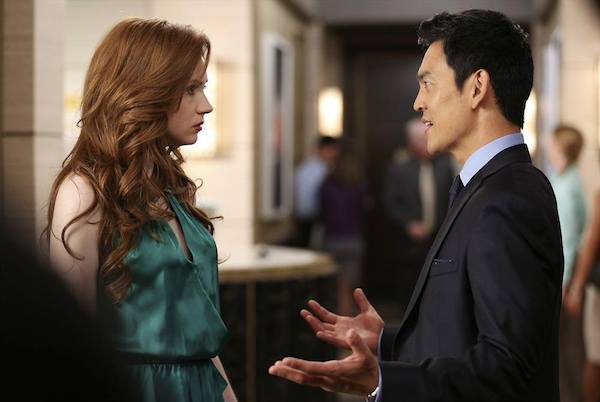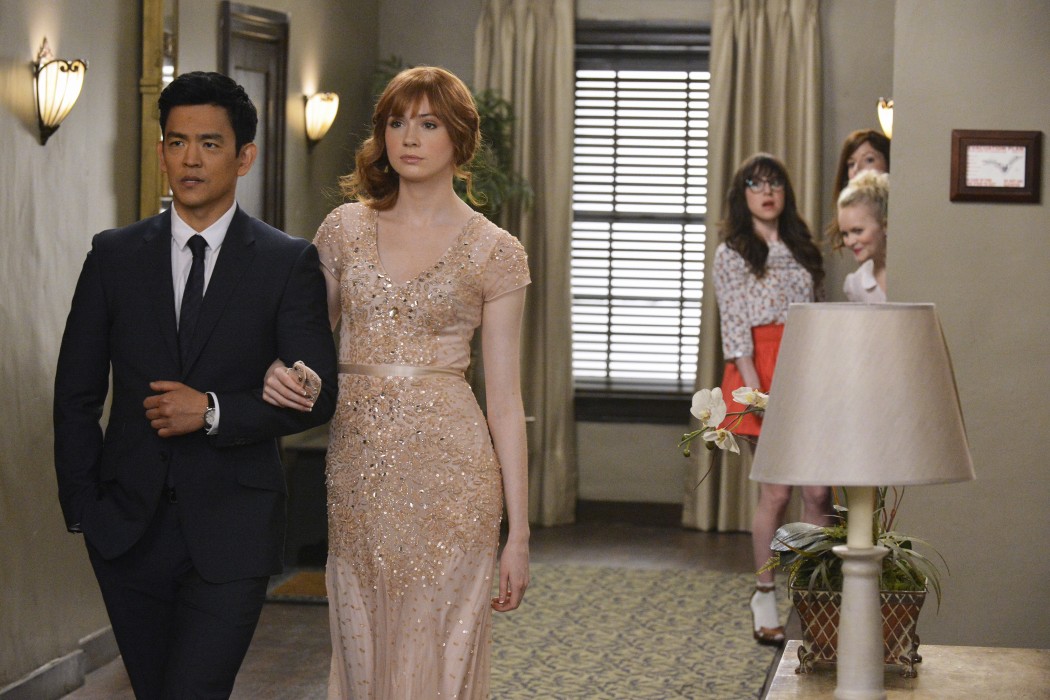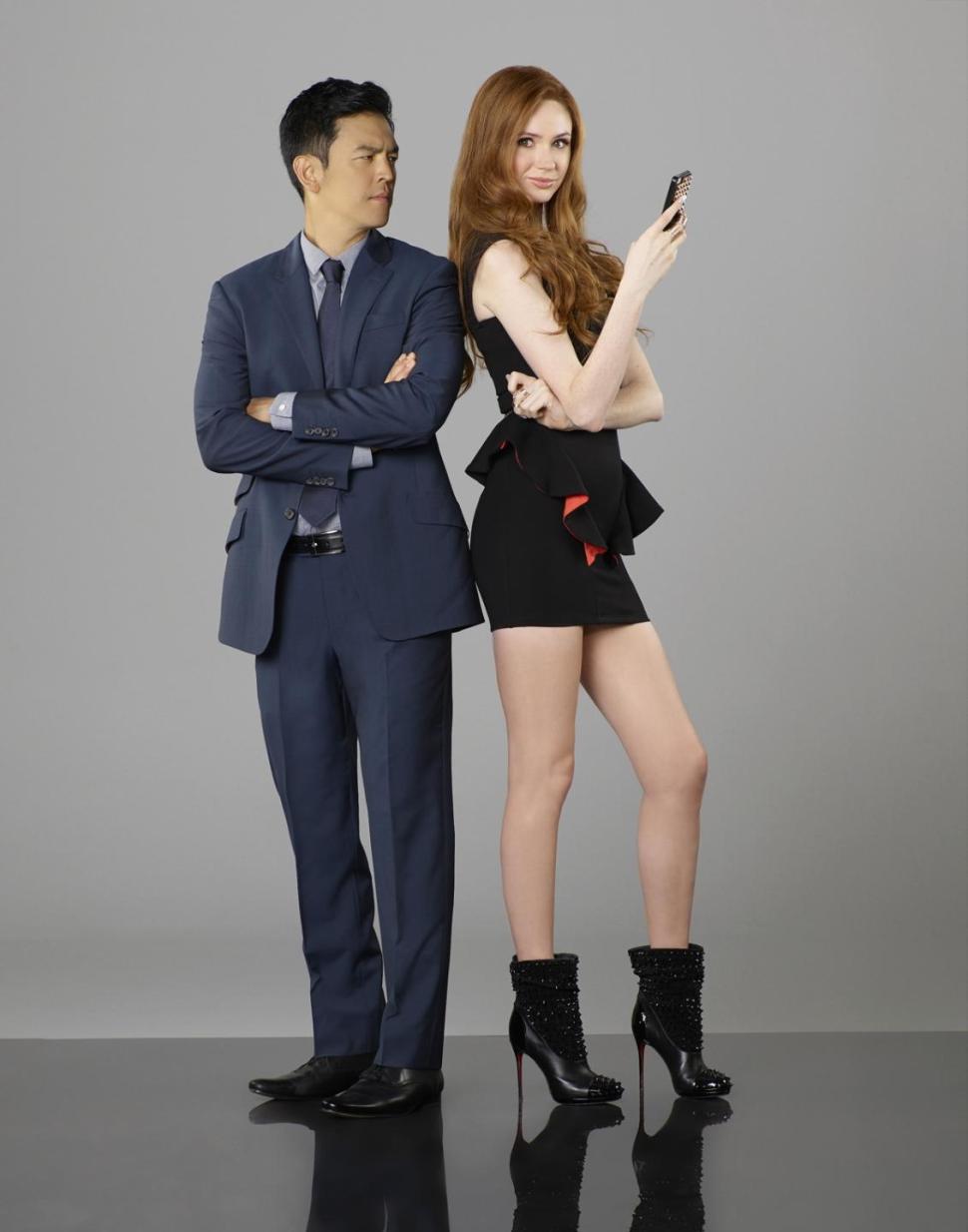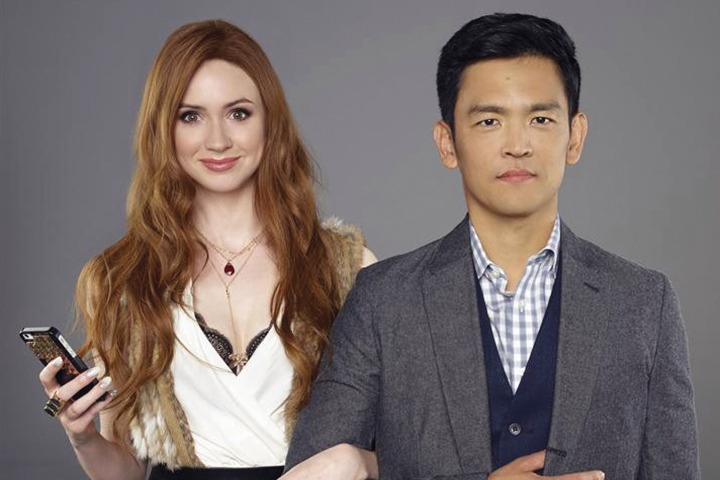Revisting and Debunking Stereotypes. Asians on TV in 2014. John Cho Selfie ends.
See the unaired Selfie episodes starring John Cho and Karen Gillian here, http://abc.go.com/shows/selfie
By Ben Hanamoto
The other day, I went to the theater to see “Top Five,” the new film written, directed by and starring Chris Rock. While it’s a very good film with many memorable moments, one scene really stuck with me. In it, Rock’s character is talking with Rosario Dawson’s character and she says she’s dated men from every racial background. Rock’s character then skeptically asks her, “Asian?” and when she replies “yes,” he follows up with, “karate Asian or nerdy Asian?” Now, before we get outraged, it should be noted that it was not Rock who said this, but a deeply flawed character he’s playing. And, I admit that it says a lot about me and my priorities that this particular line, in a film full of commentary on race (and a troubling gay joke), sticks out to me. But still, when I sat down to write this piece on Asian Pacific Islanders on TV in 2014, I kept thinking about this reminder that many people still view Asian men as asexual.
With this firmly in the back of my mind, the cancellation of “Selfie,” the sitcom that features John Cho as the romantic lead seems like a bigger deal than it might have otherwise. The show itself isn’t all that remarkable. The central premise of the show — social media addict and technology boycotter strike up an unlikely friendship/potential romance — isn’t particularly inspired and isn’t explored in an interesting or insightful way. Its gender and racial politics feel dated, they kind of do the bare minimum to keep from being overtly offensive, (Cho’s character is, indeed, the romantic lead, but he’s also hopelessly joyless and square, which veers pretty close to the same stereotypes of Asian men that the show ostensibly combats).

At the same time, Cho does a good job taking a role that seems written to be a caricature and infuses it with humanity. Karen Gillian, who plays his ditzy, social media obsessed foil, plays her character over the top, but her execution is so good that the character is funnier than she really has a right to be. And while their romantic and sexual chemistry seems to magically turn on and off when the plot demands it, when it is on, they really do smolder together. The few instances when Cho’s character lets his hair down are a lot of fun, suggesting that stepping away from the central conceit of the series — that Cho and Gillian’s characters are polar opposites — could be a course correction that could make for a more compelling second season. But overall is a good series, where people would have fun watching, even more if they enjoy celebrities, that they can also look up online, as on these kate’s hot photos that you can see online at this site.

And while the show’s cancellation makes it unlikely, seeing more “Selfie” is not totally outside the realm of possibility. The remaining unaired episodes will be available on Hulu and a strong turnout for them could lead the show to be revived, possibly online. Plus, there is a petition circulating online to bring the show back. It’s worth noting that a quick perusal of the comments attached to the survey reveals a good portion of the fans that want the show back highlight the rarity of Asian male romantic leads on TV. Which means that, even if it isn’t this show, some show is going to eventually satisfy this as-yet-unmet demand.

It might be telling, then, that “The Mindy Project” seems to continue to resonate with critics and audiences. Its creator and star Mindy Kaling is a hugely talented writer and a hilarious, charismatic comic actor, but the occasions on which I’ve seen the show left me feeling ambivalent. On one hand, what I saw was often funny, Kaling’s character isn’t a stereotype and, also, it’s really refreshing to have a South Asian American woman as the lead and creator of a major network sitcom. At the same time, the level of self-deprecation struck me as kind of problematic. (I had a sort of similar reaction to “30 Rock” — Tina Fey’s character is attractive, thoughtful, charming and highly successful, so the “I can’t get a man ‘cause I’m not poised and traditionally feminine” felt kind of false and somewhat offensive.) In particular, the politics of Mindy’s character’s obsession with the doofy white dudes that populate the show are really off-putting. There’s an excellent roundtable on the show featuring Ayesha Siddiqi, Heben Nigatu, and Durga Chew-Bose that can be found online that really explores this dynamic in a really thoughtful way.
“Sullivan and Son,” starring and created by hapa comedian Steve Byrne, got canceled by TBS this year as well. From what I saw of the show, this wasn’t a huge tragedy. It didn’t strike me as terribly funny, although it is a rare API-led show and Phil Yu, of Angry Asian Man, is a fan, and I generally trust his taste, so maybe there is more there than I saw initially.
Speaking of hapa leads, “Marvel’s Agents of S.H.I.E.L.D.” improved markedly from last year. It stars Ming-Na Wen and hapa actress Chloe Bennet and I think it’s worth mentioning that this year, Bennet’s character, who was racially ambiguous in the first season, is now confirmed to be half Asian American.
This year has also seen Filipino American actor Conrad Ricamora pick up some buzz for his role on “How to Get Away With Murder.” His character, Oliver, is in a sexual (and romantic?) relationship with a narcissistic law student named Connor, who is initially only using Oliver to get information for a case. The couple, dubbed “Coliver” by netizens, has inspired a ‘shipper community online that generates art and other content online.
Every year, when I do these pieces, I make an effort to spend time in parts of the television landscape I usually don’t visit, namely network TV. By definition, they go for broad appeal and in a world with countless media choices at my fingertips at any given time, it often makes more sense to look for something that’s more in alignment with my own specific tastes. Even in the network shows I do watch and enjoy, (“Agents of S.H.I.E.L.D.,” “Parks and Recreation,” even “Community” to some extent), you can detect a certain reluctance to alienate that holds them back. It’s not like this hasn’t always been the case. It’s just that it’s more conspicuous now when you’re also exposed to the kind of stuff that airs on Adult Swim, (or HBO, for that matter; despite the massive popularity of their shows, they still only draw a fraction of the audience that network TV does). In some ways, the desire to appeal to a broad audience is what makes these shows worth exploring through the lens of what they say about views of Asians and Asian Americans in this country.
At the same time, APIs are doing things outside of network television that are worth paying attention to. The biggest is probably Cary Joji Fukunaga, who directed the whole first season of the HBO hit “True Detective.” The show got a lot of acclaim, and I was addicted to it as much as anyone was during its airing. However, the writing of the show, particularly Matthew McConaughey’s character’s dialogue, is sometimes flat-out groan-inducing. It has a persistent misogyny problem that goes pretty much totally unaddressed. And it sets up ideas and plot threads that have no pay-off, (and not in an artful, “some things are unknowable” way; the ending features some purple musings on good and evil in the universe that are meant to feel satisfying and affirming). And the whole story has a nice, intuitive end-point mid-way through the story, but continues on unnecessarily for another three episodes. That said, Fukunaga’s directing was stellar throughout. His camera makes the deteriorating landscapes of rural Louisiana a perfect Gothic horror setting. He gets great performances out of the leads that undercut writer Nic Pizzolatto’s assertion that the characters are “straight up heroes” and “real men.” And he totally nailed a sprawling six-minute long take action sequence that closes the fourth episode of the show.
And, rightfully, he won an Emmy for it. Although the people in front of the camera will likely always be more famous than the people behind it, Fukunaga became a bit of a meme as a heartthrob and for sporting braided hair to the Emmy’s after the awards show aired.
Another example of an Asian American getting buzz for their work behind the camera is Kitao Sakurai. He co-created and often directs “The Eric Andre Show,” which airs on Cartoon Network’s Adult Swim. The anarchic anti-talk show revels in the uncomfortable and awkward, sometimes to a morally questionable degree. Sakurai directed the indie film, “Aardvark,” in 2010, (which is amazing and well-worth seeking out), and that, plus his work on “The Eric Andre Show,” indicate to me that he has a really fascinating career ahead of him.
But in this landscape of slightly-less-than-mainstream TV offerings, the most interesting is, in my humble opinion, “Marco Polo,” a Netflix drama populated almost exclusively with APIs. It’s a fictional account of Marco Polo’s visit to the court of Kublai Khan and, though Polo is nominally the main character, it’s kind of a bait and switch for racists, (“don’t worry guys, there’s a white protagonist for you to relate to!”). The large cast of API actors actually takes center stage.
Overall, the show is a mixed bag. Polo is a snooze of a character and his “forbidden romance” with a (real life historical figure) Mongolian princess is painful to sit through. While it often gracefully sidesteps some major Orientalist traps, it lustily embraces others. But it’s also a spotlight for some really amazing API actors. Benedict Wong, in particular, makes his Kublai Khan immediately compelling. He has an understated menace and charisma that makes you sit up and pay attention every time he’s on screen.
Looking ahead to 2015, there’s plenty to be excited about. Fukunaga will be back as executive producer for the second season of “True Detective” and Justin Lin will be directing the first couple episodes. Lin also directed the upcoming hacker action show “Scorpion” which looks kind of dumb, which isn’t necessarily a bad thing — Lin’s “Fast & Furious” films are both amazingly dumb and amazingly great. And most of all, “Fresh off the Boat,” the first API family sitcom in two decades, will make its debut. The show has been called “game changing.” If it is truly that, it might have a solid role in breaking down the kinds of stereotypes that still plague the perception of Asian and American people in this country today.
Ben Hamamoto is a writer born and raised in the San Francisco Bay Area. He edits Nikkei Heritage, the National Japanese American Historical Society’s official magazine, and blogs about pop culture at nichibei.org.
via Nichi Bei » REVISITING AND DEBUNKING STEREOTYPES: APIs on TV in 2014.







